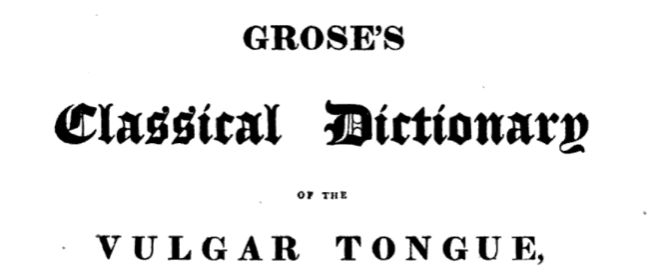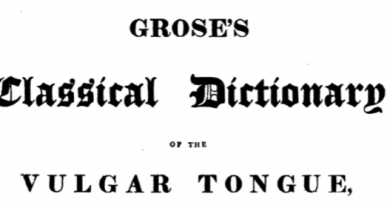Dictionary of the Vulgar Tongue – Day Seventy-Seven
The Dictionary of the Vulgar Tongue was first published at the end of the eighteenth century, and given that the Coronavirus crisis is giving too much time to read books, I thought I’d pick a daily word from it until I got bored…..
Chummage
Another one of the dictionary’s longer definitions, “money paid by the richer sort of prisoners in the Fleet and King’s Bench, to the poorer, for their share of a room. When prisons are very full, which is too often the case, particularly on the even of an insolvent act, two or three persons are obliged to sleep in a room. A prisoner who can pay for being alone, chooses two poor chums, who for a stipulated price, called chummage, give up their share of the room, and sleep on the stairs, or, as the term is, ruff it”.
A guide at the time the dictionary was published gives great details about Fleet prison, which had 109 rooms and 89 of these could receive chums. Fifteen rooms were given away to the poor or large families (and as an aside, Fleet and King’s Bench had many debtors in who would have had little money), a practice known as Bartholomew Fair, whereas three rooms had no fireplace and were exempt from chummage and two were used for the blind, the mad or those it was probably just easiest to give their space.
The process was strictly regimented so that new prisoners were placed in turn around the rooms and the concept was that the existing prisoner in a room was the owner, the newcomer was the chum. However, neither could force anything on the other, they could only pay each other out and that process was overseen by the warden. It would cost 4 shillings to buy someone out of a room, with rent then payable to the prison warden and this charge would depend whether it was a furnished or unfurnished room.
As an aside, it’s far from the free for all I had expected in nineteenth-century prisons…. But, the above rules were for master’s side of the prison, whereas the common side was a different affair. Here people were dumped in larger cells and they didn’t pay fees, but were entitled to sit and beg at the side of the prison from people passing by. This might be handy for those who were debtors and who needed to buy themselves out of prison.
There were usually around 200 prisoners in Fleet, but there were also another 75 or so who lived in the area of the Liberty of the Fleet, located around the prison. Prisoners could stay here instead, usually choosing accommodation to suit their wealth, but they had to give a deposit to the prison warden as a security against them running off. This was less as the warden was worried they might escape and go on the run, it was solely to ensure that they received their money, as prisons were run privately as profit-making enterprises.
Another prison where chummage was common, and only debtors didn’t have to pay, was Marshalsea and the going rate in 1818 was half a crown a week to “make the roommate go away”, typically to a cold and bleak part of the buildings. It’s all a sign of how the rich and the poor certainly used to have different prison experiences…..



